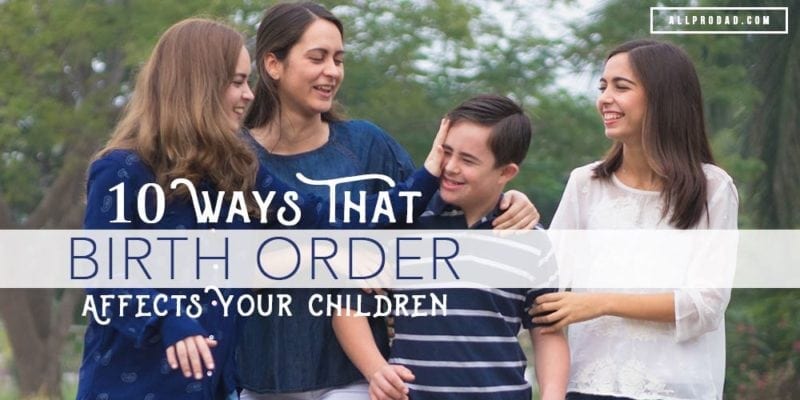There’s a family I know with four children. The first three children came close together, but the fourth came later as an unexpected gift. The difference in age between the first born and the last born is considerable. It was clear while the kids were growing up that the parents were much more “relaxed” with the fourth than the other three. The oldest, who personified responsibility, would often step in to help. One day when I was at their house, the youngest was acting up. While the parents were out of the room dealing with him, the oldest daughter turned to me and said about her parents, “Those two are ruining that kid.” When the dad came back into the room, he said to me, “(Our oldest child) has failed miserably in raising that child.” He obviously was joking and it was funny to watch. There were some clear birth order stereotypes at play.
While birth order can have a big impact on a child, parents should take caution when using it as the only reference source in their decisions regarding that particular child. However, birth order observations may provide some insight into your child’s tendencies. Here are ten ways that birth order affects your children.
1. The Eldest Overview
Firstborn children are a bit like crash test dummies. Parents are learning with every experience. The baby comes into this world and Mom and Dad both look at each other and say, “What do we do now?” Natural instinct takes over. However, there is certainly a steep learning curve when it comes to raising your oldest child.
2. The Eldest – Natural Leaders
According to author and renowned psychologist Dr. Kevin Leman, firstborn children are often high achievers, organized, and detail-oriented. He states they are natural leaders because more was expected from them. In turn, they expect more from themselves. “They’re the movers and shakers of life and they lead everything from the PTA to the U.S. Presidency.”
3. The Middle Overview
“Marsha, Marsha, Marsha.” The most famous example of the perils of being the middle child. Everything always seems to be about somebody else. At times, they can feel like the odd man out in the family. They are constantly trying to live up to the eldest’s legacy and dealing with the magic charm of the youngest. This usually makes for a mentally strong human being later in life…or someone who is insecure.
4. The Middle – Entrepreneurs
Dr. Leman claims that middle children have the best psychological chance to become entrepreneurs along the lines of Bill Gates, Donald Trump, or Steve Forbes. They are good listeners, negotiators, and people-pleasers. He also states, “They are the most loyal friend on the face of the earth.”
5. The Youngest Overview
They can’t lose position in life. The youngest child is the last and reaps the rewards of that. Moms especially hold on to their youngest as long as they can. The baby of the family almost always has the unique ability to get away with just about anything. There is a prevailing attitude in the family that wishes to protect the youngest at all costs—even when it’s not rational. The baby learns that lesson early and applies it well. The most laid-back folks on earth are usually last-born kids.
6. The Youngest – Always The Star
In Dr. Leman’s analysis, last-born children are usually happy people. They are likely to end up as entertainers, in just the family, or as their chosen career. Famous examples are Ellen DeGeneres, Eddie Murphy, and Whoopi Goldberg. They are the least likely to wind up as President of the United States. The youngest child is usually very outgoing, manipulative, and very good with people.
7. The Only Child
In a special class is the only child. Minus any sibling rivalry, the only child gains the benefits of both the eldest as well as the youngest. This, of course, can be a great thing or a curse. For instance, the solo child tends to lean towards a self-centered existence and is spoiled at times. However, they also mature much faster and are generally special achievers.
8. The Only Child – a Superhero
Dr. Leman states that, “Only children are super firstborns. They’re little adults by age seven.” They are sensitive and their feelings can be hurt very easily. In many cases, they do not get along well with children of their own age. They prefer older classmates or even adults as friends. “The only child has a great chance of being extremely successful.” Famous examples include Albert Einstein, Lance Armstrong, and Elvis Presley.
9. Twins
The mysterious children. Twins, especially identical, usually have a very deep connection with their sibling. They feel each other’s emotions and thoughts as if they were their own. In most cases, twins never lose a close relationship throughout life. For this reason, twins are often times very well-adjusted adults. They have a deep sense of security that stems from being born with a soul mate intact. Quite a gift!
10. The Other Side of the Coin
Despite the truth of all the research and facts regarding birth order, they are not the only factors at play. Many aspects go into the development of a child’s personality and the adult they will eventually become. Gender. Age gaps. Race. Social status. Religious beliefs. Married parents. Divorced parents. Many, many things. Suffice it to say, human beings cannot be pigeonholed into set molds. We are all created with our own unique gifts and purposes.











Huddle up with your kids and ask, “In what ways are you different from your siblings? Why is that good?”